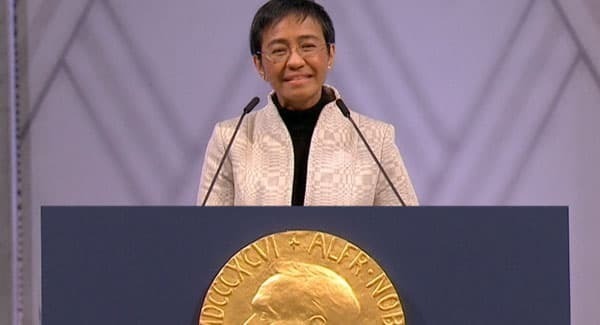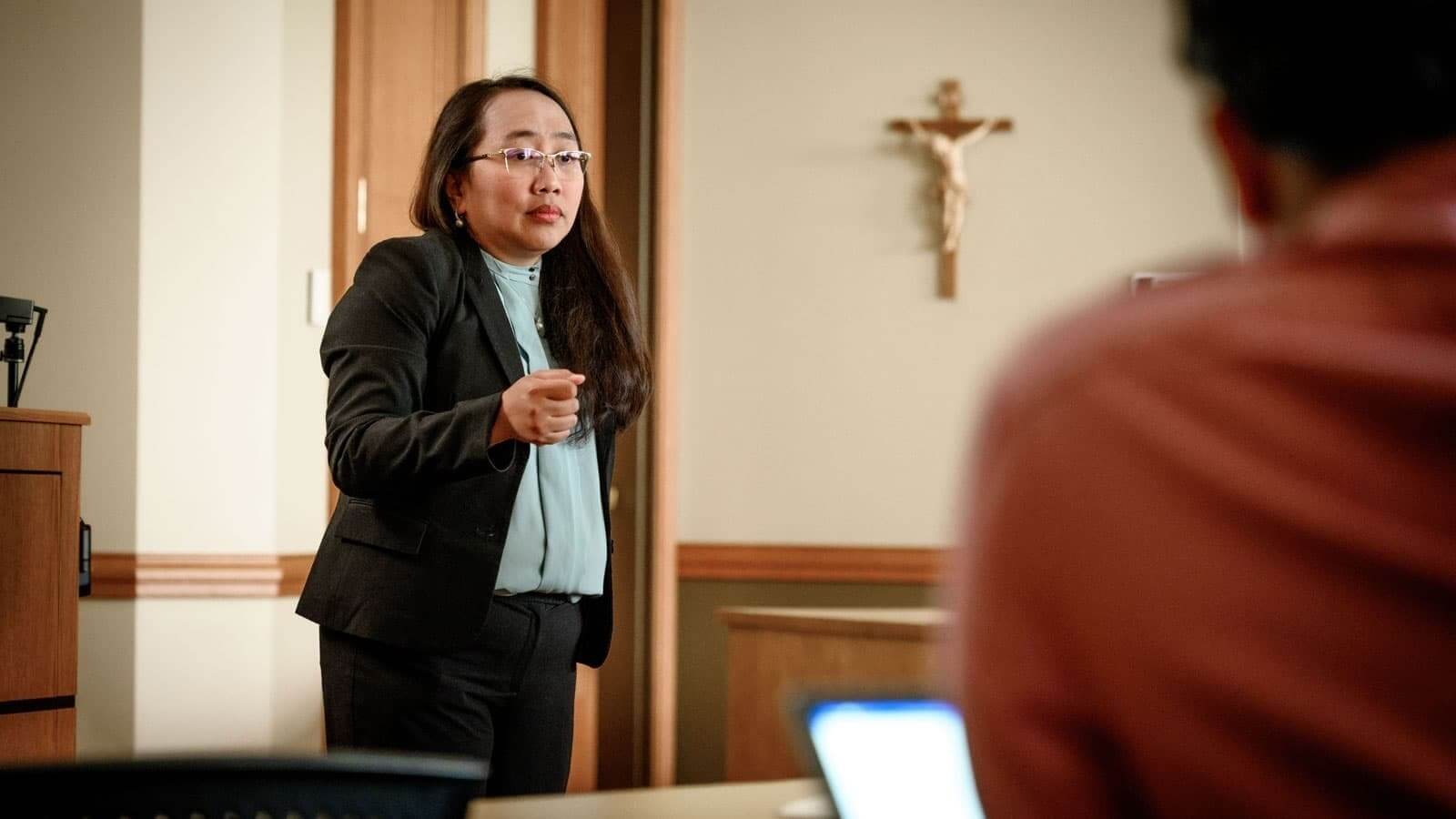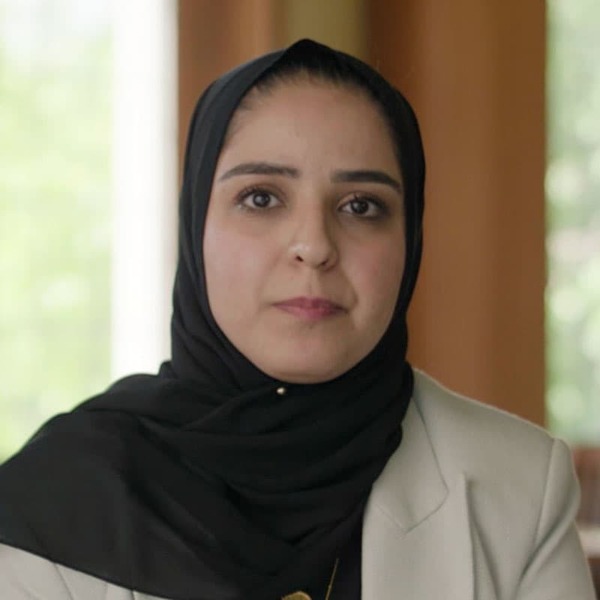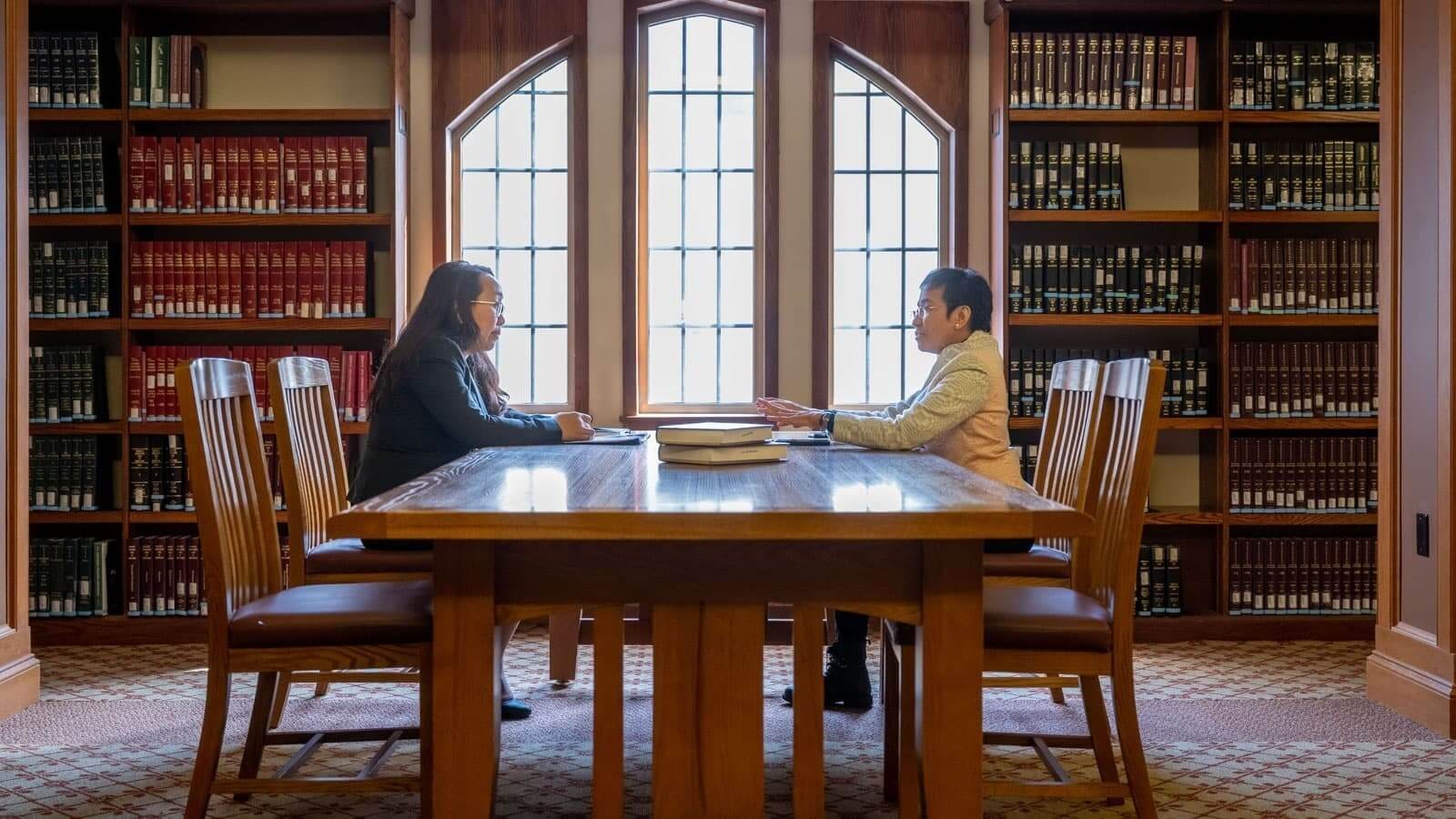Law professor Diane Desierto advocates for dignity and justice, and for her students to do the same
When Nobel laureate Maria Ressa was arrested for cyberlibel, she wasn’t shaken. In a two-year period, the Filipino American journalist, Time magazine Person of the Year, Fulbright scholar, and author of How to Stand Up to a Dictator had racked up 10 arrest warrants, plus a barrage of online hate, for her role as founder of Rappler, an independent news site known for its criticisms of authoritarian president Rodrigo Duterte. The claims ranged from fraud to tax evasion to ties with the Central Intelligence Agency, all of which were eventually dismissed.

But when her cyber libel conviction, the first of its kind in the Philippines and which carries a seven-year jail sentence, reached the country’s Supreme Court, she needed help. That help came in the form of Notre Dame law professor Diane Desierto.
Desierto is the faculty director of the LL.M. in International Human Rights Law and founding director of the Law School’s new Global Human Rights Clinic. While teaching and publishing, she also serves as a member of a United Nations working group, faculty at the Hague Academy of International Law, and international counsel at the Permanent Court of Arbitration, the UN Human Rights Committee, the International Criminal Court, the International Court of Justice, and the Philippine Supreme Court. She’s tangled with threats, attacks, and authoritarian governments, primarily in the Philippines and other Southeast Asian countries, as well as China, where she was detained twice.
Though Ressa already had a powerhouse legal team, she asked Desierto to represent her at the Philippine Supreme Court.
“I chose Diane to represent me because she had the courage to stand up. She understood the risks,” Ressa says, noting that these days lawyers are even more likely to be harassed or killed than journalists. “Yet she also understood both, from a Filipino perspective, the ties that bind and the way the law can be used to protect us.”

She smiles and says, “And she’s never lost a case.”
In a matter of days, Desierto had filed an appeal, on top of her international commitments and teaching load. But her motivation was simple: “This is the right thing to do.” She adds, “We’re the place that wants to do the right thing.”
“Human rights lawyers generally experience a range of threats. It’s not just physical threats and death threats and actual killings, but also the delegitimization of the work that they do. And that includes being discredited publicly. That includes having all forms of coercion being placed on your family. So some of the threats that I’ve dealt with have not just been physical threats to my person or detention, but have also included threats to my family’s law firm, have also included arrests and detentions and all manner of harassment and intimidation. But that’s just the tip of the iceberg that most human rights lawyers face today.” Desierto says
Desierto notes that according to recent studies, 72 percent of the world’s population live under authoritarian rule. Additionally, during the COVID pandemic, emergency regimes were set up, during which time 3,000 human rights lawyers were killed globally. That’s already a high number, but Desierto underscores the ripples of what 3,000 people could have done.
“We are trusted by a lot of places around the world where human rights defenders are under siege,” Desierto says. “They have sanctuary here, and they can grow with a community here, and they can be supported with this community.” Roqia Samim has experienced that support firsthand. Samim is a human rights lawyer from Afghanistan and a 2022 graduate from the LL.M. program.

“Notre Dame Law School and the LL.M. Program for International Human Rights Law became my home and became my shelter.”—Roqia Samim ’22 LL.M.
“Unfortunately, when I came to Notre Dame, at the same time that I arrived here, I lost my home and my country,” Samim says, citing the 2021 Taliban takeover. She adds that given her background in human rights and her advocacy for women’s rights, she fears detention, disappearance, or murder if she were to return home. “It was really hard for me to accept that there is no home for me to go back to from Notre Dame; there is no place for me to go back and work for human rights. But Notre Dame Law School and the LL.M. Program for International Human Rights Law became my home and became my shelter. They supported me here to continue my work for human rights in my country from here.”
Samim remains committed to research human rights issues and violations in Afghanistan as a senior research associate in the Law School. In that role she co-authored a piece titled “Afghan Women’s Rights as the Taliban’s Bargaining Tool for International Recognition,” which was featured by the United Nations Special Rapporteur on Human Rights Defenders. In the piece, she and co-author Tahmina Sobat ’20 LL.M. detail violations and oppression such as banning women from working or attending secondary school or university, and imposing dress codes and gender segregation rules.
“With this opportunity I can document all those human rights abuses and violations by the Taliban in Afghanistan, and provide evidence and reports to the international organizations, including United Nations, to have serious attention for these ongoing violations in my country.”
Research aside, being part of a robust, diverse, and historic community has given her confidence and a sense of belonging, she says.
“Since I came to Notre Dame, and since I attended this program, I don’t feel that I’m alone anymore. I see my work as a strong commitment to serve humanity and human beings to access their basic rights and dignity,” she says. “There are many people like me, fighting for human rights around the world. I saw that, and I learned that, here in this program. Working with a diverse group of people, a diverse group of human rights lawyers from different countries, I realized that gave me more motivation to work harder for human rights and realized that I’m not alone in this fight.”
Desierto wants that message sent to lawyers around the globe. You are not alone. You are welcome here. We at Notre Dame can and will support you.
“We have something really great here,” Desierto says. “I want to let human rights defenders know anywhere in the world that this is legitimately the one place where no topic is censored. Where no issue is ever immune from discussion. This is one place that has genuine freedom to do all of it and be all of it. Where we strive to realize the human rights outcome.”
Desierto is living that mission. While teaching and zig-zagging across the globe, she is handling Maria Ressa’s final petition and preparing for oral arguments at the Supreme Court of the Philippines.
She and Ressa await a decision, as do thousands of journalists, and hundreds of Notre Dame LL.M. alumni who also fight for human rights, all across the globe.

https://fightingfor.nd.edu/2023/fighting-to-defend-human-rights/
This post was originally published on Hans Thoolen on Human Rights Defenders and their awards.

